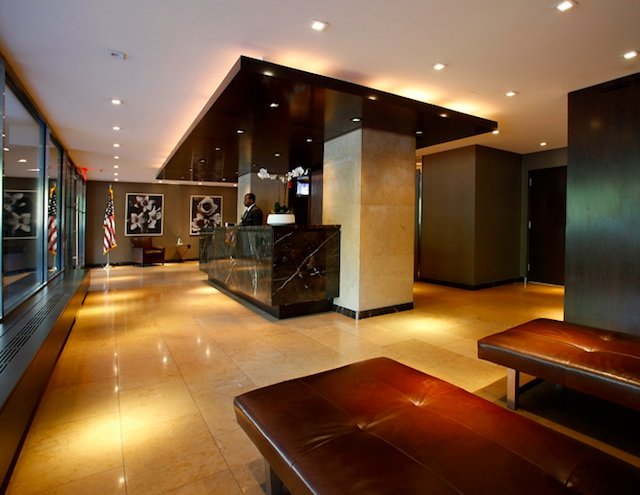Lawmakers Seek To Ban "Poor Doors" & Other Forms Of Housing Discrimination
May 18, 2014, 1 p.m.
Two city councilmembers are drafting a bill that would prevent developers from making gyms and other amenities for market-rate tenants only.

The lobby at Stonehenge Village on West 96th
Developers earn tax credits for allotting space in their buildings for low-income tenants (the process is a major prong in de Blasio's $42 million housing plan) but that doesn't mean these tenants have the same rights as the ones paying market rate. "Poor doors" and new-tenants-only gyms are legal tools for these owners to bully and segregate the renters who are keeping them from maximizing profit, but that may change soon. The Times reports that two city council members are drafting a bill that would outlaw this kind of economic discrimination.
“The city has just begun to wake up and see that if we don’t act, this is going to be an increasing problem,” Upper West Side councilmember Mark Levine says. Levine, along with Corey Johnson, are seeking to widen the city's anti-discrimination code to protect rent regulated tenants.
Sarah Denby, a tenant at 230 Riverside Drive, who lives in a rent-controlled one-bedroom with her husband, a resident of 60 years, says her building's gym is off-limits.
It’s ridiculous to have a gym here that I can’t use. At one point I got so mad: I can store the bike in the bike room but I can’t have a key. I have to return it right away or the doormen freak out. They absolutely flip out. They just besiege me.
And just who are these people who are unworthy of sharing the common spaces in their own homes?
Rent-regulated tenants are likely to be elderly or minorities, particularly in Manhattan, according to data provided by the New York University Furman Center for Real Estate and Urban Policy. In 2011, 73.4 percent of market-rate renters in Manhattan were white and nearly 77 percent of market-rate owners were white. By comparison, only 47 percent of rent-regulated tenants in Manhattan were white. While fewer than 5 percent of market-rate tenants are seniors, nearly 20 percent of rent-regulated tenants are age 65 or older.
Jean Green Dorsey, who has lived in her two-bedroom, rent-stabilized apartment in Stonehenge Village since 1972, is the president of the tenants association in her building on West 96th Street, and has noted that only 40% of the tenants are allowed to use their in-house gym: “Nobody makes me a second-class citizen in my own home. I had thought that by the time I got to be classified as fragile elderly that I would not have to fight this fight.”